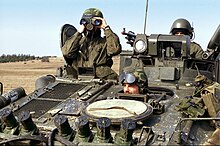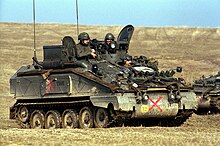Armoured personnel carrier
| FV103 Spartan | |
|---|---|
 A Spartan APC conducting an amphibious capability demonstration A Spartan APC conducting an amphibious capability demonstration | |
| Type | Armoured personnel carrier |
| Place of origin | United Kingdom |
| Production history | |
| Produced | 1978 |
| No. built | 967 |
| Specifications | |
| Mass | 10,670 kg (10.50 long tons) 9 ton 55 lbs Battle weight |
| Length | 5.16 metres (16.9 ft) |
| Width | 2.48 metres (8 ft 2 in) |
| Height | 2.63 metres (8 ft 8 in) |
| Crew | 3, with 4 passengers |
| Main armament | 1 x 7.62 mm General Purpose Machine Gun |
| Engine | Jaguar J60 4.2 litre DOHC inline six-cylinder petrol engine 252 lbs/ft at 3,000 rpm replaced with Cummins 5.9 turbo diesel 190 hp (140 kW) at 4,500 rpm |
| Power/weight | 17.9 hp/t |
| Suspension | Torsion bar |
| Operational range | 320 mi (510 km) |
| Maximum speed | 60 mph (96 km/h) |
FV103 Spartan is a tracked armoured personnel carrier. It was developed for the British Army as the APC variant of the Combat Vehicle Reconnaissance (Tracked) family. The vehicle can carry up to seven personnel, including three crew members. Armed with a single machine gun, it is almost indistinguishable from the FV102 Striker in external appearance.
Rather than a general personnel carrier for infantry, the Spartan had been used for moving specialist teams, such as anti-aircraft missile teams. An anti-tank variant of the Spartan armed with MILAN anti-tank missiles was produced, named the FV120 Spartan MCT. Nearly 500 Spartans served with the British armed forces since entering service in 1978. Replacement by newer vehicles started in 2009. The vehicle is now out of British service.
Design and features
The FV103 Spartan was developed during the 1970s as the Armoured Personnel Carrier (APC) version of the British Army's Combat Vehicle Reconnaissance (Tracked) (CVR(T)) family of armoured fighting vehicles, designed by Alvis plc. The vehicle entered service with the British military in 1978. The Spartan is similar in appearance to the FV102 Striker, except for the missile launcher on the Striker.
The Spartan was powered by a 4.2l XK Jaguar petrol engine. The vehicle is 5.16 metres (16.9 ft) in length and 2.48 metres (8 ft 2 in) in width. With a ground clearance of 0.33 metres (1 ft 1 in), it has a height of 2.63 metres (8 ft 8 in). As the APC variant of the CVR(T) family, the FV103 has been used by small specialized groups such as mortar fire controller teams, anti aircraft teams and also reconnaissance teams.

The vehicle can carry seven personnel, in a combination of three crew members and four passengers or two crew members and five passengers. It is armed with one 7.62 mm L37A1 machine gun, and can have four smoke dischargers on each side. In addition to the APC role, it has been used as a resupply vehicle for the FV102 Striker, carrying extra Swingfire missiles.
The FV103 has a combat weight of 10,670 kilograms (23,520 lb). It has a maximum speed of 96 kilometres per hour (60 mph) and has a range of 510 kilometres (320 mi). It is capable of negotiating up to 60% gradients.
Variants and service
An anti-tank variant of the FV103 was produced, named the FV120 Spartan MCT (Spartan with MILAN Compact Turret). The FV120 has a two-man turret, and carries thirteen MILAN Anti-Tank Light Infantry Missiles, with two in launch positions.
A 'stretched Spartan' design with an extra road wheel was considered as a future replacement for the FV430, able to carry three more dismounted personnel (7+3 crew), and replacing the Jaguar petrol engine with a Perkins diesel offering greater range. CVR(T) prototype number 11 (a Scorpion) was cut and extended to demonstrate the basic hull could be used as a ten-man Armoured Personnel Carrier (APC), and a diesel engine fitted. After tests confirmed the stretched version retained the mobility of the basic CVR(T), MVEE built another prototype from scratch with a wider hull called the FV4333. Alvis later purchased the design rights, renamed the vehicle the Alvis Stormer, and developed it further.
In 2006 it was reported to the House of Commons that 478 FV103 vehicles were in service with the armed forces of the United Kingdom in April of that year, 452 of them in a deployable state. By 2007, 495 FV103 Spartans were in the service of the United Kingdom. These were replaced by mid-2009 with Panther Command and Liaison Vehicles.
Belgium began using Spartans, along with other CVR(T) vehicles, in their cavalry units from 1975.
Ukraine
On 11 April 2022, during the 2022 Russian invasion of Ukraine, the United Kingdom approved the delivery of 120 armored vehicles, including FV103 Spartan combat vehicles, to Ukraine following a meeting between UK prime minister Boris Johnson and Ukrainian president Volodymyr Zelensky in an unannounced visit to Kyiv. Johnson pledged 120 armored vehicles and new anti-ship missile systems for Ukraine as part of another £100 million (€120 million, $130 million) commitment to delivering high-grade military equipment. 35 Spartans had been donated by the UK government, and had proved very successful.
A crowdfunding appeal by the Prytula Foundation launched on 2 November 2022 raised US$5.5m to buy 60 ex-British Army FV103 Spartans, to be delivered to Ukraine that year.
In February 2023, Unite With Ukraine procured 6 more Spartans for service with the Territorial Defense Forces of the Armed Forces of Ukraine. As of September 2024, 13 units were destroyed, 2 damaged and 2 captured by Russian Forces.
Operators
Current operators
 Botswana – 6
Botswana – 6 Iraq
Iraq Jordan
Jordan Latvia – 198
Latvia – 198 Nigeria
Nigeria Oman
Oman Ukraine - during the 2022 Russian invasion of Ukraine, the British government announced that 35 FV103 Spartan vehicles would be donated to Ukraine. Local reports show use of the vehicles at the frontline in July 2022. A crowd-sourcing appeal in November 2022 set out to fund the acquisition of additional 50 Spartans for the Ukrainian Army however, after the appeal concluded, they had raised enough to fund as many as 60 such vehicles.
Ukraine - during the 2022 Russian invasion of Ukraine, the British government announced that 35 FV103 Spartan vehicles would be donated to Ukraine. Local reports show use of the vehicles at the frontline in July 2022. A crowd-sourcing appeal in November 2022 set out to fund the acquisition of additional 50 Spartans for the Ukrainian Army however, after the appeal concluded, they had raised enough to fund as many as 60 such vehicles.
Non-state operators
 Islamic State - West Africa Province - captured from the Nigerian Army in 2020.
Islamic State - West Africa Province - captured from the Nigerian Army in 2020.

Former operators
 United Kingdom – in service with the British Army, Royal Marines and the RAF Regiment until late 2000's.
United Kingdom – in service with the British Army, Royal Marines and the RAF Regiment until late 2000's.
 Belgium – until 2005
Belgium – until 2005
See also
References
- "FV103 Spartan: Armored personnel carrier", Military Today, 2007, archived from the original on 8 February 2007
- Miller, David (2000). The illustrated directory of tanks of the world. Zenith Imprint. p. 381. ISBN 978-0-7603-0892-9.
- ^ Chant, Christopher (1987). A compendium of armaments and military hardware. Routledge. p. 63. ISBN 978-0-7102-0720-3.
- ^ Pike, John (18 June 1999). "Spartan". FAS Military Analysis Network.
- ^ "Spartan and Other CVR(T) Vehicles". British Army. 2009. Archived from the original on 14 January 2009.
- ^ Rinaldi, Richard A. (2002). "Modern British Army Equipment (1950s–2000)" (PDF). Orders of Battle. Archived from the original (PDF) on 29 December 2009.
- Pike, John (2 August 2013). "CVR(T)". Global Security.
- Foss, Christopher (1981). Jane's Armour and Artillery 1981-82. Jane's Publishing Co Ltd. ISBN 9780531039762.
- "House of Commons Hansard Written Answers for 04 July 2006". United Kingdom Parliament. 4 July 2006. Retrieved 20 March 2010.
- "United Kingdom: Strategic Export Controls Annual Report 2007". British Foreign and Commonwealth Office. July 2008. p. 95. Archived from the original on 24 September 2012. Retrieved 20 March 2010.
- "Panther". Ministry of Defence (United Kingdom). 2008. Archived from the original on 24 December 2008.
- "Historique du Premier Régiment de Lanciers" (in French). Belgian Army. Archived from the original on 7 March 2012. Retrieved 20 March 2010.
- "Ukraine: Boris Johnson in Kyiv meeting with Zelenskyy — as it happened". Deutsche Welle. 9 April 2022.
- ^ Boffey, Daniel (3 November 2022). "'A joke that went out of control': crowdfunding weapons for Ukraine's war". The Guardian.
- OctoberCMS. "Unite With Ukraine procures 25 British armoured vehicles for the Territorial Defense Forces". unitewithukraine.com. Retrieved 23 April 2024.
- "Attack on Europe: Documenting Ukrainian Equipment Losses During the Russian Invasion of Ukraine".
- International Institute for Strategic Studies (2021). The Military Balance. p. 451. ISBN 9781032012278.
- "Alvis FV107 Scimitar Armed Reconnaissance Vehicle". www.militaryfactory.com. Retrieved 23 April 2024.
- "NBS saņēmuši visas 2014. gadā parakstītajā līgumā paredzētās kāpurķēžu izlūkošanas mašīnas CVR(T)". Sargs.lv (in Latvian). 26 October 2020. Retrieved 23 April 2024.
- Abdullahi, Murtala (29 October 2021). "Nigerian Army Inducts Type 89 Armored Personnel Carrier". HumAngle. Retrieved 23 April 2024.
- Stewart, Heather; Sabbagh, Dan (21 April 2022). "Ukrainian soldiers training in UK to use British armoured vehicles". The Guardian. Retrieved 22 April 2022.
- "The Weaponry of IS West Africa (Pt. 5): Curious Capabilities". Calibre Obscura. 23 December 2021. Retrieved 1 November 2023.
- "Belgium Land Systems List (Current and Former Types)".
Further reading
- Howard, Les. Winter Warriors – Across Bosnia with the PBI 1995/1996. The Book Guild, 2006, ISBN 1-84624-077-8
| British armoured fighting vehicles of the post-war era | |||||
|---|---|---|---|---|---|
| Tanks | |||||
| Infantry fighting vehicle | |||||
| Reconnaissance vehicles |
| ||||
| Armoured personnel carriers |
| ||||
| Infantry mobility vehicles |
| ||||
| Internal security vehicle | |||||
| Tank destroyers | |||||
| Self-propelled artillery | |||||
| Self-propelled anti-air |
| ||||
| Combat engineering vehicles | |||||
| Armoured recovery vehicles | |||||
| Experimental, prototype, export | |||||
| UK unarmoured or non-fighting vehicles | |||||